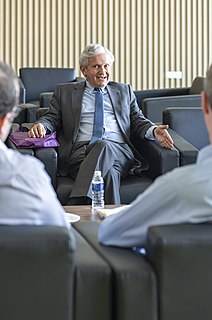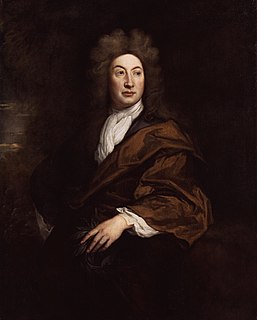
The Keeper or Master of the Rolls and Records of the Chancery of England, known as the Master of the Rolls, is the President of the Civil Division of the Court of Appeal of England and Wales and Head of Civil Justice. As a judge, the Master of the Rolls is second in seniority in England and Wales only to the Lord Chief Justice. The position dates from at least 1286, although it is believed that the office probably existed earlier than that.

The Buchanan Medal is awarded by the Royal Society "in recognition of distinguished contribution to the medical sciences generally". The award was created in 1897 from a fund to the memory of London physician Sir George Buchanan (1831–1895). It was to be awarded once every five years, but since 1990 the medal has been awarded every two years.
The Master of the Jewel Office was a position in the Royal Households of England, the Kingdom of Great Britain and the United Kingdom. The office holder was responsible for running the Jewel House, which houses the Crown Jewels. This role has, at various points in history, been called Master or Treasurer of the Jewel House, Master or Keeper of the Crown Jewels, Master or Keeper of the Regalia, and Keeper of the Jewel House. In 1967, the role was combined with Resident Governor of the Tower of London.

The British Poet Laureate is an honorary position appointed by the monarch of the United Kingdom, currently on the advice of the prime minister. The role does not entail any specific duties, but there is an expectation that the holder will write verse for significant national occasions. The origins of the laureateship date back to 1616 when a pension was provided to Ben Jonson, but the first official holder of the position was John Dryden, appointed in 1668 by Charles II. On the death of Alfred, Lord Tennyson, who held the post between November 1850 and October 1892, there was a break of four years as a mark of respect; Tennyson's laureate poems "Ode on the Death of the Duke of Wellington" and "The Charge of the Light Brigade" were particularly cherished by the Victorian public. Three poets, Thomas Gray, Samuel Rogers and Walter Scott, turned down the laureateship. The holder of the position as at October 2022 is Simon Armitage who succeeded Carol Ann Duffy in May 2019.

The Lieutenant of the Tower of London serves directly under the Constable of the Tower. The office has been appointed at least since the 13th century. There were formerly many privileges, immunities and perquisites attached to the office. Like the Constable, the Lieutenant was usually appointed by letters patent, either for life or during the King's pleasure.

Justice of the Common Pleas was a puisne judicial position within the Court of Common Pleas of England and Wales, under the Chief Justice. The Common Pleas was the primary court of common law within England and Wales, dealing with "common" pleas. It was created out of the common law jurisdiction of the Exchequer of Pleas, with splits forming during the 1190s and the division becoming formal by the beginning of the 13th century. The court became a key part of the Westminster courts, along with the Exchequer of Pleas and the Court of King's Bench, but with the Writ of Quominus and the Statute of Westminster, both tried to extend their jurisdiction into the realm of common pleas. As a result, the courts jockeyed for power. In 1828 Henry Brougham, a Member of Parliament, complained in Parliament that as long as there were three courts unevenness was inevitable, saying that "It is not in the power of the courts, even if all were monopolies and other restrictions done away, to distribute business equally, as long as suitors are left free to choose their own tribunal", and that there would always be a favourite court, which would therefore attract the best lawyers and judges and entrench its position. The outcome was the Supreme Court of Judicature Act 1873, under which all the central courts were made part of a single Supreme Court of Judicature. Eventually the government created a High Court of Justice under Lord Coleridge by an Order in Council of 16 December 1880. At this point, the Common Pleas formally ceased to exist.
The English College, Lisbon was a Roman Catholic seminary that existed from the 17th century to the 20th century.
English county histories, in other words historical and topographical works concerned with individual ancient counties of England, were produced by antiquarians from the late 16th century onwards. The content was variable: most focused on recording the ownership of estates and the descent of lordships of manors, thus the genealogies of county families, heraldry and other antiquarian material. In the introduction to one typical early work of this style, The Antiquities of Warwickshire published in 1656, the author William Dugdale writes:
I offer unto you my noble countriemen, as the most proper persons to whom it can be presented wherein you will see very much of your worthy ancestors, to whose memory I have erected it as a monumentall pillar and to shew in what honour they lived in those flourishing ages past. In this kind, or not much different, have divers persons in forrein parts very learnedly written; some whereof I have noted in my preface: and I could wish that there were more that would adventure in the like manner for the rest of the counties of this nation, considering how acceptable those are, which others have already performed

The trial of William Laud, archbishop of Canterbury, took place in stages in the first half of the 1640s, and resulted in his execution on treason charges. At first an impeachment, the parliamentary legal proceedings became an act of attainder.
Edward William Grinfield (1785–1864) was an English biblical scholar.
Events from the year 1721 in Scotland.
The Evangelical Magazine was a monthly magazine published in London from 1793 to 1904, and aimed at Calvinist Christians. It was supported by evangelical members of the Church of England, and by nonconformists with similar beliefs. Its editorial line included a strong interest in missionary work.
The Phytologist was a British botanical journal, appearing first as Phytologist: a popular botanical miscellany. It was founded in 1841 as a monthly, edited by George Luxford. Luxford died in 1854, and the title was taken over by Alexander Irvine and William Pamplin, who ran it to 1863 with subtitle "a botanical journal".
This page is based on this
Wikipedia article Text is available under the
CC BY-SA 4.0 license; additional terms may apply.
Images, videos and audio are available under their respective licenses.





